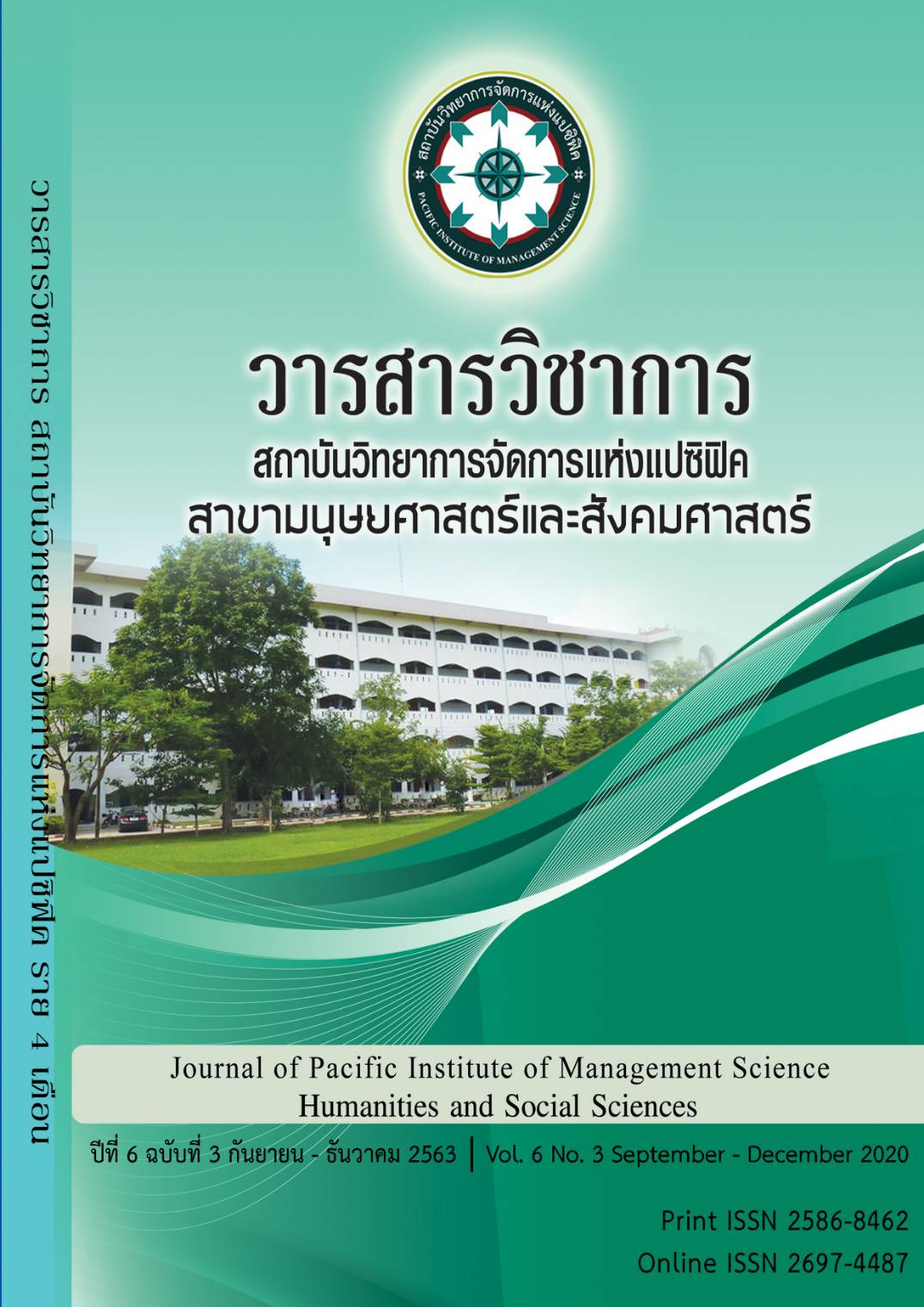Causal Factors and Measures to Prevent Recidivism Among Inmates Convicted of Property Crimes: A Case Study of Pathum Thani Provincial Prison
Keywords:
Causal Factors and Preventive Measures, Recidivism, Inmates Convicted of Property CrimesAbstract
This research consists of three objectives. The first objective is to examine causal factors and motives for recidivism among inmates convicted of property crimes. The second objective is to explore behavioural rehabilitation approach and legal measures to prevent recidivism among inmates convicted of property crimes. The final objective aims to propose measures to prevent recidivism among inmates convicted of property crimes. Qualitative research methods were employed to collect data, including documentary research and in-depth interviews with 15 key informants. The key informants were comprised of: 1) a group of convicted inmates at the Pathum Thani Provincial Prison, and 2) a group of police officers at Pathum Thani Provincial Police Station. Content analysis was then utilised to analyse collected data and report research findings.
According to research findings, it was found that Pathum Thani is a province in the vicinity of Bangkok, where social conditions have rapidly changed. The migration from other regions and an increase in migrant labours generated cultural diversity, leading to a new society in which crimes increasingly occurred, particularly a high volume of property crimes. The causal factors and motives for recidivism among inmates convicted of property crimes were categorised into three issues, including 1) economic condition, 2) social condition, and 3) acquaintances. These factors were major and distinct motives for property crime recidivism in Thai society.
According to behavioural rehabilitation for perpetrators at the moment, only a handful of ex-prisoners were able to apply knowledge and skills from the rehabilitation training programme to their lives. Notably, the most important factors that contributed to their problems in lives after being released included a lack of opportunities for employment, social unacceptance, and prison labelling. These factors led to unemployment and a lack of social commitment among former inmates in society, resulting in more recidivists. Accordingly, the excess of prisoners in penitentiaries had become a serious problem for the criminal justice system in Thailand. Thus, an understanding of underlying causal factors could pave the way for the development of better preventive measures to effectively terminate recidivism among inmates convicted of property crimes.
References
ฉัตรกุล พงษ์ธรรม. (2556).ปัจจัยที่มีความสัมพันธ์กับพฤติกรรมการกระทำผิดเกี่ยวกับทรัพย์. วิทยานิพนธ์ มหาบัณฑิต, สาขารัฐประศาสนศาสตร์, สถาบันบัณฑิตพัฒนาบริหารศาสตร์, กรุงเทพมหานคร.
ตะวันฉาย มิตรประชา. (2557). “ปัจจัยที่มีอิทธิพลต่อการกระทำความผิดซ้ำของเยาวชน เพื่อหาแนวทางในการพัฒนาเยาวชนภายหลังการปล่อยตัว”. วารสารวิชาการมหาวิทยาลัยปทุมธานี. 6(1), 34-46.
พรชัย ขันตี. (2553). ทฤษฎีอาชญาวิทยา : หลักการ งานวิจัย และนโยบายประยุกต์. กรุงเทพฯ: หจก.สุเนตร์ฟิล์ม.
พรชัย ขันตี, กฤษณพงค์ พูตระกลู, และ จอมเดช ตรีเมฆ. (2558). ทฤษฎีอาชญาวิทยา :หลักการงานวิจัยและนโยบายประยกุต์. กรุงเทพฯ:ส.เจริญการพิมพ์.
เรือนจำจังหวัดปทุมธานี. (2563). สถิติจำนวนผู้ต้องขังกระทำความผิดดซ้ำในเรือนจำจังหวัดปทุมธานีในคดีเกี่ยวกับทรัพย์ ตั้งแต่ปี พ.ศ. 2558-2562. [เอกสารอัดสำเนา].
วีระชัย เหล่าลงอินทร์, เกรียงศักดิ์ ไพรวรรณ, สุวกิจ ศรีปัดถา และพัชนี บูรพันธ์. (2552). การกระทำความผิดซ้ำของผู้ต้องขังในเรือนจำจังหวัดมหาสารคาม. วารสารมหาวิทยาลัยมหาสารคาม. 3(1), หน้า 29-38.
สาธิต บุษยกุล. (2555). สาเหตุการกระทำผิดซ้ำของผู้ต้องขังชาย กรณีศึกษาเรือนจำพิเศษกรุงเทพมหานคร.สารนิพนธ์ รัฐประศาสนศาสตร์.มหาวิทยาลัยธุรกิจบัณฑิตย์, กรุงเทพมหานคร.
สุดสงวน สุธีสร. (2552). อาชญาวิทยาและงานสังคมสงเคราะห์. กรุงเทพฯ: โรงพิมพ์มหาวิทยาลัยธรรมศาสตร์.
สำนักข่าวไทยพีบีเอส. (2562). เงื่อนไข! ใครเข้าข่ายได้-ไม่ได้ รับพระราชทานอภัยโทษ. สืบค้นจาก
https://news.thaipbs.or.th/content/287121
สำนักงานสภาพัฒนาการเศรษฐกิจและสังคมแห่งชาติ. (2562). แผนพัฒนาเศรษฐกิจและสังคมแห่งชาติ ฉบับที่ 12 (พ.ศ. 2560–2564). สืบค้นจากhttps://www.nesdc.go.th/ewt_w3c/main.php? filename=develop_issue
Merton, Robert K. (1986). Social Theory and Social Structure. Glencoe, III: The Free Press.
Downloads
Published
Issue
Section
License
บทความที่ได้รับการตีพิมพ์เป็นลิขสิทธิ์ของ สถาบันวิทยาการจัดการแห่งแปซิฟิค
ข้อความที่ปรากฏในบทความแต่ละเรื่องในวารสารวิชาการเล่มนี้เป็นความคิดเห็นส่วนตัวของผู้เขียนแต่ละท่านไม่เกี่ยวข้องกับสถาบันวิทยาการจัดการแห่งแปซิฟิค และคณาจารย์ท่านอื่นๆในสถาบันฯ แต่อย่างใด ความรับผิดชอบองค์ประกอบทั้งหมดของบทความแต่ละเรื่องเป็นของผู้เขียนแต่ละท่าน หากมีความผิดพลาดใดๆ ผู้เขียนแต่ละท่านจะรับผิดชอบบทความของตนเองแต่ผู้เดียว







